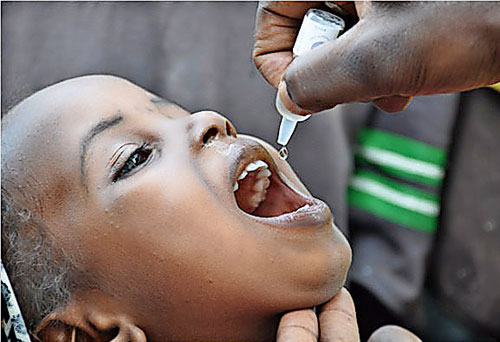Sunday Times 2
Why can’t we end polio?
View(s):By Ilona Kickbusch, Stephen Matlin, and Michaela Told
BERN, LONDON, GENEVA – October 24, 2016, should be a unique day in the history of polio. If all goes according to plan, it will be the last annual World Polio Day before the disease is eradicated. But now is not the time for celebration or complacency; while we know how to eliminate polio, we have not yet finished the job.

Child receiving polio vaccine in mouth.
Consider this: in August 2014, the World Health Organization declared the Ebola crisis in West Africa a Public Health Emergency of International Concern (PHEIC); it lifted that status in March 2016. In May 2014, the WHO declared the international spread of wild poliovirus a PHEIC as well; yet that status is still active today, leaving one to wonder if world leaders are paying sufficient attention.
They should be. The continuing polio PHEIC is endangering the success of the Global Polio Eradication Initiative (GPEI), into which the world has invested $15 billion since it was launched in 1988; and it threatens global health generally.
For starters, the GPEI effort to interrupt poliovirus transmission could miss its latest target date; unfortunately, it would not be the first time. By the original 2000 target date, the incidence of polio had been reduced by more than 99%, from an estimated 350,000 cases in 1988. Since then, however, a long, stubborn “tail” of infection has persisted, mainly in remote, poor regions and conflict zones. The effort to tackle these lingering cases is laborious, and it remains incomplete, despite PHEIC status.
To be sure, there have been some successes, such as in India, which was certified polio-free in 2014, and in Nigeria, which interrupted transmission the same year. But there have also been setbacks: in 2016, Nigeria suddenly had two new cases among children from an area that had just been liberated from the militant group Boko Haram.
The two other polio-endemic countries, Afghanistan and Pakistan, missed their 2015 eradication target and have had to extend it by another year, at a cost of $1.5 billion. The root causes of both countries’ missed deadlines will require delicate, skilled political handling to resolve. They include internal conflicts that make children inaccessible to public-health professionals, opposition by some religious leaders, and public mistrust of national governments and international initiatives.
Eradicating polio is expensive, but it would cost tens of billions of dollars more to fight the disease in perpetuity. Politicians and policymakers should be reminded that a polio-free world would be a global public good, that eradication is by far the best bargain, and that sustained financing and political support is necessary to ensure the GPEI’s success.
But it is also important to ensure that valuable assets and practices built up by the GPEI over time are not squandered once polio is gone. These include cold chains to preserve vaccines during transport from factories to patients; established “immunization days” and negotiated “days of tranquility” in conflict zones, when vaccinations can be administered; trained health-care workers; and systems for surveillance, laboratory analysis, and rapid response. These assets have proved their worth in combating other diseases: Nigeria was able to stop Ebola’s spread during the West Africa outbreak owing to its efficient polio-tracking system.
The reality, however, is that countries will be able to absorb GPEI assets into their health systems only if they are supported financially, logistically, and politically. A major effort will be required to transfer materials to where they are needed, and to coordinate surveillance and laboratory operations. Doing so would not only boost global-health security and resilience for the next outbreak; it would also help us reach the United Nation Sustainable Development Goal for universal health-care coverage.
More broadly, lessons from the GPEI and other eradication efforts must not go unlearned. In 1980, smallpox became the first disease in people to be successfully eradicated, and there were prior unsuccessful campaigns against hookworm, yaws, yellow fever, and malaria. But many lessons that were already known by the 1980s went unheeded for too long – such as the importance of tackling remote infection reservoirs and maintaining high immunisation levels everywhere so that health systems aren’t overwhelmed.
A complex array of political pressures, motives, and aspirations determines which lessons we take from history, and which new global-health targets we set for ourselves. World Polio Day is thus an occasion to urge politicians to renew their commitments to polio eradication, and to apply lessons from the GPEI to improve health everywhere.
In the fight against polio, the world is largely relying on the generosity of the United States, Rotary International, the Bill and Melinda Gates Foundation, and European countries such as Germany, Norway, and the United Kingdom (with additional political support from others such as Monaco). Other European countries and the European Commission itself should do more to contribute to the eradication effort.
While G7 member states renewed their commitment to eliminating polio at a summit in Japan earlier this year, a subsequent G20 summit in Hangzhou, China, where two-thirds of the world’s population was represented, made no reference to it; nor did the G77 group of 134 developing countries at its last meeting.
That is not good enough. After years of effort, it is now clear that only a strong, consistent, worldwide commitment to full eradication can end the polio emergency.
(Ilona Kickbusch is a Director of the Global Health Centre and an adjunct professor at the Graduate Institute of International and Development Studies, Geneva. Stephen Matlin is a senior fellow at the Global Health Centre at the Graduate Institute of International and Development Studies, Geneva. Michaela Told is Executive Director of the Global Health Centre at the Graduate Institute of International and Development Studies, Geneva.)
Courtesy: Project Syndicate, 2016. Exclusive to the Sunday Times. www.project-syndicate.org

